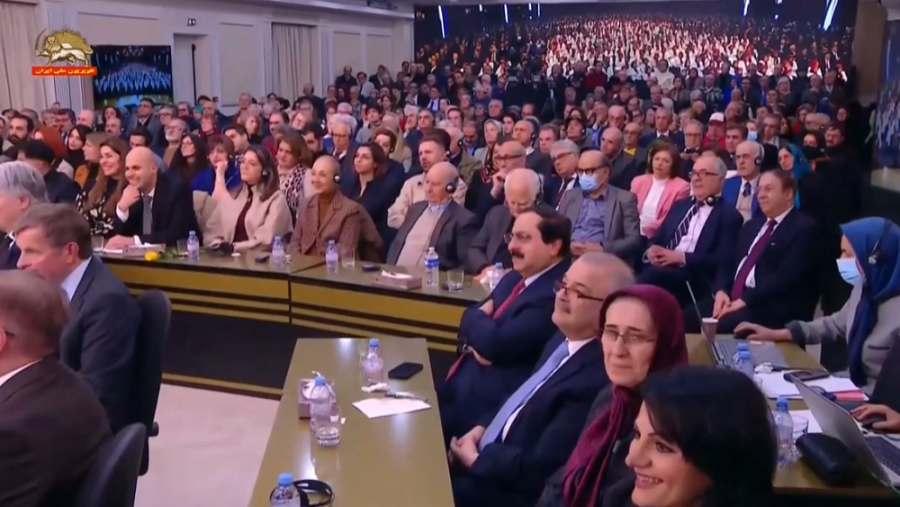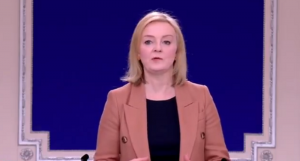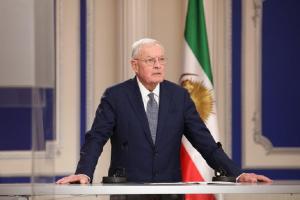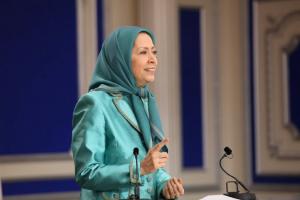
(video)Prominent Global Leaders Unite in Support of Resistance and Democracy in Iran
Liz Truss urged strict sanctions, enforcement and backing for the Iranian Resistance. She praised protesters and the NCRI’s democratic vision for Iran’s future.
PARIS, FRANCE, January 18, 2025 /EINPresswire.com/ -- The National Council of Resistance of Iran (NCRI) Foreign Affairs Committee in an article announced that Paris, January 11, 2025 – An international conference on the future of Iran brought together distinguished political and military figures in Paris, where they highlighted the urgent need for a shift in global policy toward the Iranian regime. The gathering underscored the importance of the Iranian Resistance and its role as a viable democratic alternative to the ruling theocracy.
Speakers included Mrs. Maryam Rajavi, President-elect of the National Council of Resistance of Iran (NCRI); Gen. James Jones, former U.S. National Security Advisor; Liz Truss, former Prime Minister of the United Kingdom; John Bercow, former Speaker of the UK Parliament; Janez Janša, former Prime Minister of Slovenia; Yulia Tymoshenko, former Prime Minister of Ukraine; General Tod Wolters, former NATO Commander and Commander of U.S. Forces in Europe; David Jones, former UK Minister; and Gen.
Keith Kellogg, former National Security Advisor to U.S. Vice President Mike Pence. Ola Elvestuen, former Minister of Climate and Environment of Norway, also addressed the conference, alongside several members of NCRI supporters present at the meeting.
Messages of solidarity were sent by members of the People’s Mojahedin Organization of Iran (PMOI/MEK) based in Ashraf 3, Albania, further amplifying the calls for democracy, human rights, and the overthrow of the Iranian regime.
In her speech, Mrs. Maryam Rajavi emphasized the regime’s fragility. “The boycott of the 2024 elections and the fall of the Syrian dictatorship demonstrate that the Iranian regime is on the brink of collapse,” she declared.
Mrs. Rajavi highlighted three critical factors contributing to this crisis: widespread public dissatisfaction due to corruption and economic collapse, regional defeats, and the growing strength of organized Resistance Units within Iran. “The Resistance Units in Tehran and other cities are advancing the great task of preparing for an organized uprising,” she stated.
Mrs. Rajavi also presented the NCRI’s Ten-Point Plan for a democratic Iran, advocating for “freedom, gender equality, a non-nuclear future, and the separation of religion and state.” She urged Western governments to abandon appeasement policies, saying, “The recognition of the Iranian Resistance is a necessary part of a firm policy against the mullahs’ regime.” She concluded with a call to action: “The overthrow of this regime is the only way to establish freedom in Iran and peace in the region.”
Gen. James Jones described 2024 as “catastrophic for the Iranian regime.” He noted the strategic collapse of Tehran’s regional influence following the fall of the Assad regime in Syria, Hezbollah’s near-collapse, and setbacks in Yemen. “The fall of Bashar al-Assad delivered a crushing blow to the regime’s expansionist strategy,” Jones said.
He commended the bravery of MEK-affiliated Resistance Units, stating, “These brave men and women remind us that the spirit of resistance in Iran is alive.” He highlighted Iran’s severe internal crises, including hyperinflation, rampant corruption, and nationwide protests. “Repression cannot extinguish the flames of resistance,” he asserted, calling for comprehensive measures, including sanctions and the closure of regime-linked terror hubs in Europe.
“We must recognize the NCRI as the legitimate voice of the Iranian people,” Jones urged, emphasizing the need for the international community to adopt a firm stance against the regime.
Liz Truss criticized past Western appeasement policies, stating, “Appeasement only strengthened the regime.” She highlighted the regime’s vulnerabilities following Assad’s fall and internal economic crises. “Iran is on the verge of acquiring a nuclear weapon, and this poses an existential threat to global peace,” she warned.
Liz Truss called for “maximum pressure sanctions, rigorous enforcement, and support for the Iranian Resistance.” She lauded the courage of Iranian protesters and the NCRI’s leadership, saying, “The NCRI offers a clear and democratic vision for Iran’s future.” She concluded, “The time for change is now. A non-nuclear, democratic Iran is within reach, and the international community must stand with the Iranian people.”
John Bercow passionately emphasized the NCRI’s role as a democratic alternative to the Iranian regime. “Mrs. Rajavi and the NCRI are the embodiment of vision, courage, and leadership,” he said. Bercow condemned the regime’s systemic economic failures and brutal repression, noting, “Millions of Iranians boycotted the sham elections of 2024, rejecting the regime’s corrupt system.”
He described the Resistance Units as “interwoven with Iranian society” and a testament to the people’s determination for change. “The regime’s weakness is evident, and the NCRI offers a roadmap for a peaceful transition to democracy,” Bercow stated. He urged the international community to support the NCRI, stating, “Appeasement does not work; the alternative is a democratic Iran led by its people.”
Please rewrite the following sentences, but limit the words to 250 characters:
He highlighted the Iranian regime’s growing vulnerabilities, attributing its weakness to “strategic overreach by its leaders” and increasing global awareness of its instability. Kellogg noted, “The regime in Iran is weaker and more vulnerable than it has been in decades. It should not be feared but challenged.”
Gen. Kellogg criticized past policies of appeasement, referencing President Trump’s withdrawal from the Iran nuclear deal as a turning point. “We began a campaign of maximum pressure on Iran’s leaders, which was working,” he stated, pointing to economic measures that crippled Iran’s oil exports. He called for the reinstatement of such policies, urging coordinated international action.
He commended the NCRI’s Ten-Point Plan, describing it as “a clear transitional path to a friendly, stable, and non-nuclear Iran.” Concluding, he said, “The hope is here; now, we must take action.”
Janez Janša underscored the importance of recognizing the NCRI as the legitimate democratic alternative. “The people of Iran deserve democracy, freedom, and the protection of human rights,” he stated. Janša criticized Europe’s past engagement strategies with Iran, calling them a failure. “It is time to transition from engagement to firmness,” he declared, advocating for sanctions enforcement and the designation of the IRGC as a terrorist organization.
The former Slovenian PM warned against repeating historical mistakes, saying, “Unpunished evil always returns.” He commended the NCRI’s Ten-Point Plan, stating, “This plan represents a clear path to a democratic Iran.” He concluded by urging the international community to support the Iranian Resistance, emphasizing that “change in Iran is inevitable, and the NCRI is the key to achieving it.”
Yulia Tymoshenko drew parallels between Iran’s struggle for freedom and Ukraine’s fight against tyranny. “The Iranian regime is one of the gravest threats to global stability,” she stated, highlighting its support for terrorism and repression. Tymoshenko praised the courage of Iranian women leading protests, calling them “the heart of the movement for change.”
She criticized the regime’s role in destabilizing the region and urged the international community to take decisive action. “The Iranian people are not asking for military intervention but for moral and political support,” Tymoshenko said.
She stressed the importance of sanctions and the recognition of the NCRI as the legitimate voice of the Iranian people. “The fall of the Iranian regime is inevitable, and it will mark a turning point for global peace and stability,” she concluded.
General Tod Wolters described 2025 as a transformative year for Iran, calling for immediate action to capitalize on the regime’s growing fragility. “The campaign momentum is on our side, not the regime’s,” he stated, commending the unwavering efforts of the Iranian Resistance. “For over four decades,
you have given your blood, sweat, and tears to correct the nefariousness of the regime.
The time has come to advance our cause and rid the world of this oppressive regime,” Wolters declared.
Referencing recent developments, particularly the transition in Syria, Gen. Wolters highlighted the strategic vulnerability of Tehran. “The conditions are correct on the ground and strategically,” he emphasized, asserting that now is the time to push forward. He praised the NCRI’s comprehensive six-month plan and two-year milestones as essential to building a democratic Iran. “This plan is sound, with the momentum gained over the years across diplomatic, informational, military, and economic fronts,” he noted.
Wolters concluded by underscoring the importance of persistent advocacy to maintain momentum. “The information environment is yearning for repetitive comments from us on exactly what it is we are doing,” he said. “2025 will be transformative for the great citizens who represent a free and democratic Iran,” he affirmed.
David Jones expressed optimism about the future of Iran in 2025, declaring, “The events of the past year, especially the fall of Bashar al-Assad, signify a turning point for the regime in Tehran.”
He described Assad’s overthrow as a “pivotal loss” for the Iranian regime, which had relied on Syria as a corridor for supporting Hezbollah and maintaining regional influence. “The collapse of the IRGC’s intervention in Syria highlights the vulnerability of the regime,” he emphasized, adding that it “sends a strong message to those within Iran who wish to restore democratic institutions.”
Jones also condemned the regime’s domestic repression, including nearly 1,000 executions in 2024 under President Masoud Pezeshkian. Despite this brutality, he noted the resilience of the Iranian people and the determination of the Resistance Units. “The Iranian Resistance has a unique approach. It seeks no financial or military support only the recognition of the Iranian people’s right to remove the regime,” he explained.
Ola Elvestuen underscored the Iranian regime’s deliberate defamation campaign against the National Council of Resistance of Iran (NCRI) as a stark reflection of its fear of organized resistance. “Tehran’s fear of the NCRI is evident through its persistent demonization. We witness this firsthand in Norway, particularly whenever the NCRI is favorably mentioned in the media or when we organize meetings in parliament,” he explained.
Elvestuen shared how the regime’s disinformation strategy attempts to portray the opposition as fragmented to dissuade support. “The regime wants to paint a picture of disunity to confuse parliamentarians and the public, undermining the strong resistance movement that actually exists,” he added.
Despite these efforts, Elvestuen called for global acknowledgment of the NCRI’s legitimacy. He emphasized the importance of political parties, beyond individual parliamentarians, rallying in solidarity.
“Sanctions alone are not enough. The international community must recognize and engage with the true agents of change—the Iranian people and their organized resistance,” he stated. Elvestuen also praised the NCRI’s Ten-Point Plan, describing it as “a blueprint for a free and democratic Iran.” He concluded, “A free and democratic Iran is not only within reach but essential for stability in the Middle East and beyond.”
To subscribe weekly Newsletter of NCRI, please use this link. https://bit.ly/3SMgEla
To visit the Museum of the Resistance Movement, please use the link below.
https://my.matterport.com/show/?m=7rZUkzroZEj
To view the whole text, please use the link below.
https://www.ncr-iran.org/en/news/iran-resistance/prominent-global-leaders-unite-in-support-of-resistance-and-democracy-in-iran/
Shahin Gobadi
NCRI
+33 6 61 65 32 31
email us here
“We must recognize the NCRI as the legitimate voice of the Iranian people,”Jones said for the international community to adopt a firm stance against the regime.
Distribution channels: Human Rights, International Organizations, Politics, U.S. Politics, World & Regional
Legal Disclaimer:
EIN Presswire provides this news content "as is" without warranty of any kind. We do not accept any responsibility or liability for the accuracy, content, images, videos, licenses, completeness, legality, or reliability of the information contained in this article. If you have any complaints or copyright issues related to this article, kindly contact the author above.
Submit your press release




